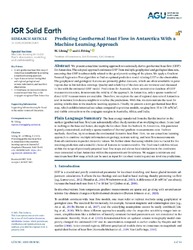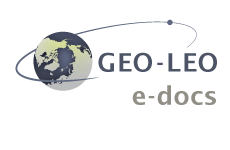Predicting Geothermal Heat Flow in Antarctica With a Machine Learning Approach
DOI: https://doi.org/10.1029/2020JB021499
Persistent URL: http://resolver.sub.uni-goettingen.de/purl?gldocs-11858/9518
Persistent URL: http://resolver.sub.uni-goettingen.de/purl?gldocs-11858/9518
Lösing, M.; Ebbing, J., 2021: Predicting Geothermal Heat Flow in Antarctica With a Machine Learning Approach. In: Journal of Geophysical Research: Solid Earth, Band 126, 6, DOI: 10.1029/2020JB021499.
 |
Dokument öffnen: |
We present a machine learning approach to statistically derive geothermal heat flow (GHF) for Antarctica. The adopted approach estimates GHF from multiple geophysical and geological data sets, assuming that GHF is substantially related to the geodynamic setting of the plates. We apply a Gradient Boosted Regression Tree algorithm to find an optimal prediction model relating GHF to the observables. The geophysical and geological features are primarily global data sets, which are often unreliable in polar regions due to limited data coverage. Quality and reliability of the data sets are reviewed and discussed in line with the estimated GHF model. Predictions for Australia, where an extensive database of GHF measurements exists, demonstrate the validity of the approach. In Antarctica, only a sparse number of direct GHF measurements are available. Therefore, we explore the use of regional data sets of Antarctica and its tectonic Gondwana neighbors to refine the predictions. With this, we demonstrate the need for adding reliable data to the machine learning approach. Finally, we present a new geothermal heat flow map, which exhibits intermediate values compared to previous models, ranging from 35 to 156 mW/m2, and visible connections to the conjugate margins in Australia, Africa, and India. Plain Language Summary:
The heat energy transferred from the Earth's interior to the surface (geothermal heat flow) can substantially affect the dynamics of an overlying ice sheet. It can lead to melting at the base and hence, decouple the ice sheet from the bedrock. In Antarctica, this parameter is poorly constrained, and only a sparse number of thermal gradient measurements exist. Indirect methods, therefore, try to estimate the continental Antarctic heat flow. Here, we use a machine learning approach to combine multiple information on geology, tectonic setting, and heat flow measurements from all continents to predict Antarctic values. We further show that using reliable data is crucial for the resulting prediction and a mindful choice of features is recommendable. The final result exhibits values within the range of previously proposed heat flow maps and shows local similarities to the continents once connected to East Antarctica within the supercontinent Gondwana. We suggest a minimum and maximum heat flow map, which can be used as input for ice sheet modeling and sea level rise predictions. Key Points:
A new geothermal heat flow map of Antarctica is established by adopting a machine learning approach.
Input features include both global and regional geological and tectonic information, and heat flow observations.
A Gondwana reconstruction shows connections of heat flow at the conjugate margins of East Antarctica.
Statistik:
ZugriffsstatistikSammlung:
This is an open access article under the terms of the Creative Commons Attribution License, which permits use, distribution and reproduction in any medium, provided the original work is properly cited.

